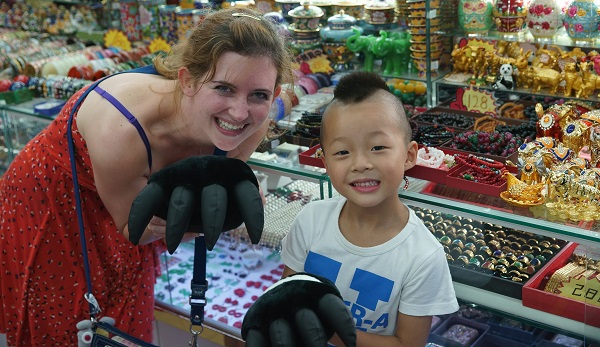General News » News
Brewing up a new perspective on China through film
October 14, 2015 · 0 Comments

By Brock Weir
China has served as a muse for creativity for centuries, but few young people in North America have the opportunity to be welcomed inside the muse to flex their creative muscles – at least until they are older and more established.
Local filmmaker Sonetta Duncan, however, counts herself among the privileged few. Ms. Duncan was one of just a handful of York University students invited to China over this past summer to participate in “Looking at China”, an initiative of the Academy for International Communication of Chinese Culture, Beijing Normal University, and the Hulin Foundation.
100 young university film students from more than 20 countries participated in the program, which ran between July and August, and each student had the chance to explore and find inspiration for individual documentary films.
“I am in filmmaking because I want to make a difference, and the difference I want to make has a lot to do with social change,” explains Ms. Duncan. “I feel culture and travel is very important to that. If we don’t see other cultures, we’re not going to be able to really look at the world and look at the people we’re living with and be able to appreciate the struggles they have gone through and how they have given back.”
Looking At China was, for her, not only a chance to see a different side of the world on an all-expense paid trip, but soak in these first hand experiences.
“After flying for almost a day and being sick the whole plane ride, we landed past midnight and were welcomed by this sea of yellow shirts,” she recalls. “Everyone was so happy to see us, but we were all so exhausted, but there was just this nice moment of we’re all here, maybe we should be in bed right now, but we wouldn’t want to be anywhere else but right here at this moment.
“Right off the bat, I knew it was going to be really focused on the relationship between us and the Chinese students and really working together. It wasn’t just going to be about making the film, experiencing the culture, but about the friendships you are making and the people you are meeting there.”
A practicing Buddhist, Ms. Duncan has always had an interest in Asian culture and tradition. That being said, Ms. Duncan didn’t go into the trip with any preconceived notions about the people she would be meeting and working with, but there were cultural shifts that were interesting to uncover. To the outsider, travelling on the roads of Kaifeng, the home-base for the students, one might see them as a sea of chaos, with an unending cacophony of revving and honking, and nobody appearing to abide by the rules of the road. Dig deeper, however, and you realise people aren’t honking out of anger or to overtake, but just to make their presence known.
On the ground, the students were tasked with their individual projects, but were teamed up with Chinese students who served as translators and production assistants. The team of three would work in tandem. At first, Ms. Duncan considered focusing her documentary on Buddhism but when another student zeroed in on Taoism, she shifted gears, and one of her partners suggested looking a bit closer at tea.
“Tea is always something that has been significant to me because my family is Scottish,” she explains. “Tea has always been a huge part of my life, but I know almost nothing about it. What better place to learn about it than China? Soon, the relationship between tea and music began to form and it was hard to ignore.
“Anyone who was ever talking about tea was also talking about music. There was always a connection and I think it is because tea is such a huge part of life to begin with. I got super lucky with this topic because the whole time I was basically walking around filming people while I drank tea, which is really nice in China! It was the perfect topic.”
Ms. Duncan’s documentary, along with those produced by her fellow York University students, unspool at a university event this week. At the moment, however, she is not entirely satisfied with the finished product and hopes to spend the next few months re-cutting it before submitting it to local film festivals such as the Toronto International Film Festival and Reel Asia.
“I hope people recognize that all cultures on the surface look very, very different and unique,” she says. “Maybe there is a language barrier, or maybe it is difficult to appreciate a different culture but, at the end of the day, we are all in this together. While I was making a project that might seem, on the surface, to be just about tea, it is about so much more than that. It is about the culture out there in China, the lifestyle, and the friendships we made. If people are just watching the film to enjoy the music or tea [culture], that is perfectly okay, but I would like people to look a little bit deeper to start questioning how much they actually know about culture.
“[Being chosen for this program] does validate you as an artist. We are all in our 20s and trying to figure out at this stage in their life whether or not this is what we are meant to be doing. You do have your self-validation as an artist, but you are seeking that from your peers and your professors and it is really amazing to be rewarded for your hard work. It really does help you recognize this is what you’re meant to be doing and you will have opportunities to continue. It brought my whole university experience to a close.”











